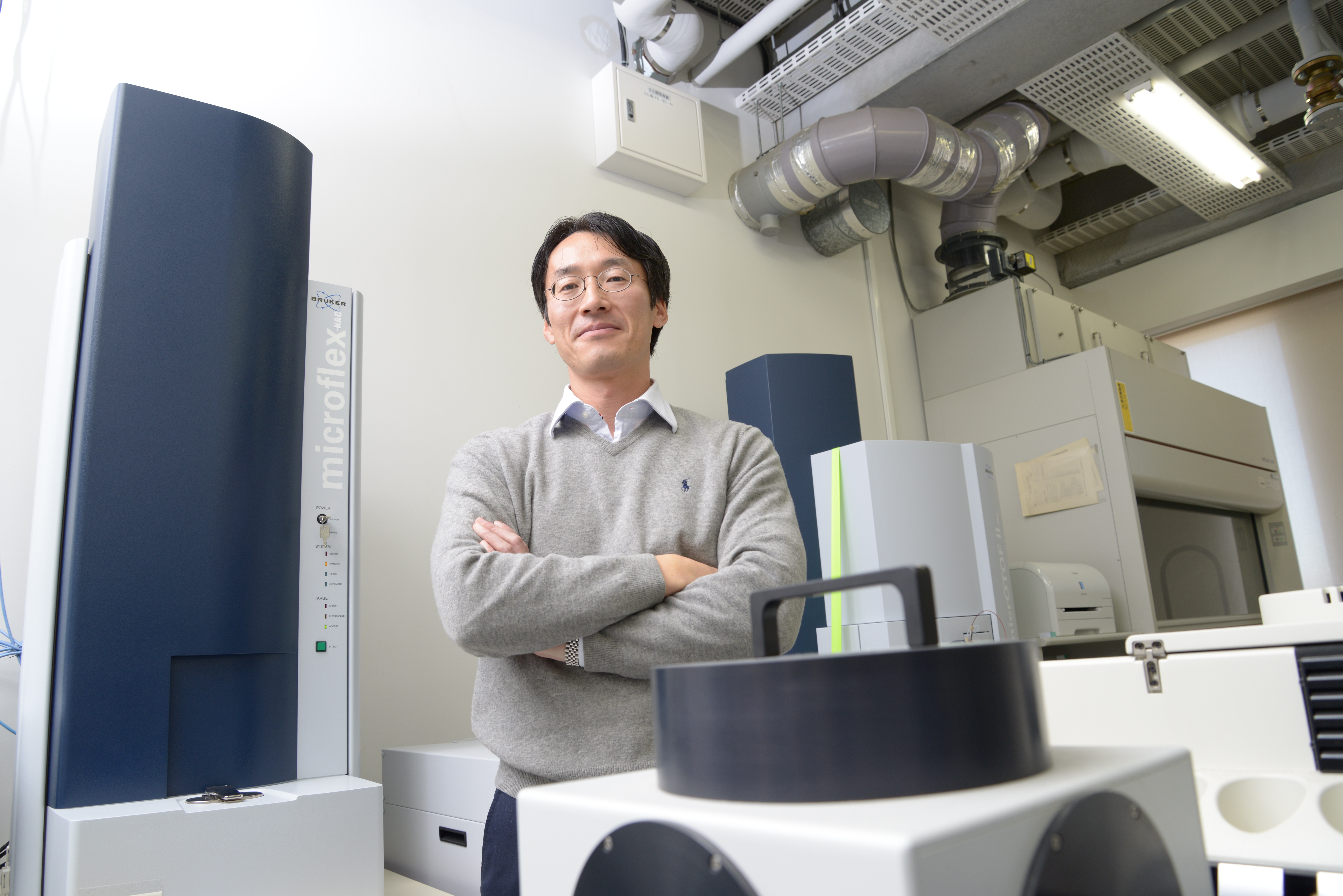- HOME
- Research at RCAST
- Visit to Laboratories
- Okamoto Laboratory
Okamoto Laboratory

In my laboratory, we conduct leading-edge research in biology utilizing chemistry.
Learning chemistry and biology thoroughly is the minimum requirement in this laboratory, but we open our doors to anyone highly motivated.
I want doctoral students, in their three years, to know various things, read as many journal papers as possible to get good ideas for new research, and conduct all the experiments they can think of.
Even if they cannot get the results they want in their experiments, students should make steady efforts keeping their spirits high, as it often happens that experiments turn out to be a failure.
We welcome students with an indomitable spirit.
After graduating from my laboratory three years later, I want them to be full-fledged researchers who can take an active part in their own field.
Fusion of Chemistry and biology
Prof. Okamoto tries to solve the mysteries of living phenomena by studying the behavior of nucleic acids and proteins, and also actively uses such applied research for early diagnosis or genetic diagnosis of cancer for practical use in clinical medicine. He is a pioneer who has opened up new fields of research by introducing the methods of synthetic organic chemistry into the fields of biology or genetics.
For example, with the techniques developed by Prof. Okamoto, anyone can easily examine whether or not targeted DNA can be found. A chemical reaction called the "excitonic interaction" is utilized. In this reaction, two dye molecules do not emit fluorescence when they are arranged parallel to each other but they do when they arranged separately. When artificial nucleic acid forms a double helix, dye molecules come into the gaps of base pairs. Then dye molecules part from each other and produce fluorescent green. Owing to the fluorescent green, it is quite obvious whether or not the targeted DNA is found, even if its mechanism is not understood. "Researchers including me should enhance the technology they developed to the point where the general public can easily utilize it without knowing its principle, which is our role in the society, " said Prof. Okamoto.
Dream of Becoming a Tour Conductor
Prof. Okamoto was born and grew up in Nagoya City and entered School of Synthetic Chemistry, Faculty of Engineering, Kyoto University. Hearing this, you may expect that he took the first step towards his dream of becoming a chemist. But he said, that actually he wanted to be a tour conductor when he was a university student. He obtained a license as a certified general travel consultant when he was at the university. He had a future image of finding employment with a travel agency and traveling all over the world.
But he finally went on to the master's course. "At first I didn't think positively about my master's course. But as I got used to the atmosphere of the laboratory to which I was attached, I gradually made up my mind to go on to graduate
school," he explains with a smile. Although at the beginning of his career he was hesitating over whether or not he should become a researcher, his desire to achieve results beyond expectations was much stronger than any other student. "I liked to have my supervisors surprised by showing them the results of experiments which I secretly conducted," He said, looking back on his youth. When he entered the doctoral course, he finally decided what to do in the future. He resolved to spend his life not as a tour conductor but as a researcher who travels all over the world to attend conferences.
What He Expects of Students
"The research we have been tackling leads to the development of technology which can be used for the treatment of cancer or customized medicine which can contribute to a healthy and long-lived society," Prof. Okamoto explains. The fusion of chemistry and biology in research is required more and more for the upcoming super-aged society.
He wants those students who choose this field of research to firmly learn both chemistry and biology first, and from that to obtain the ability to become independent as researchers that can think by themselves in their three years of doctoral course. "I want them to read as many journal papers of various fields as possible regardless of their own specialty. It is important to get leadingedge information by putting up their own antenna. Since there are faculties of both arts and science across disciplines in RCAST, students will surely get good stimulus for their research from such an environment."
Regardless of their specialty, even if they haven't majored in chemistry in their college days, students with a strong desire to tackle the research are welcomed. "We welcome examinees from various fields as long as they think that our theses appeal to them," he said.





